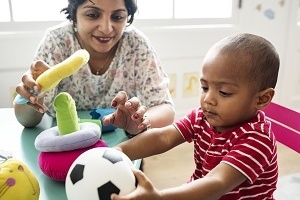Here we look at... why willpower is so important. When children start to control their impulses. Where the behaviour comes from. And tips for how you can help your child develop self-control.
We all know self-control is an important part of life. Being able to control our impulses, desires and the way we express ourselves is one of the first things society expects of us (Tao et al, 2014).
So why is it so important?
Self-control is an important concept for little ones, not just parents. Sure, that pot of poster paint looks like the tastiest thing on the menu. But it might not be what we want them to eat for lunch. Putting plastic toys in the washing machine might have been cute the first time but not the 500th. For their safety and our sanity, self-control can be a winner.
It’ll probably come as no surprise that self-control doesn’t come naturally from the start. We’ve all seen toddlers taking another kid’s toy, or pushing in when there’s a queue for the slide. Developing good self-control from a young age can be beneficial not only now, but also in the long term.
One study found that four-year-old children who managed to control their impulses for longer (delayed gratification) got better school results. They were also able to cope better with frustration and stress (Mischel, 1989). Another study followed 1,000 children for 30 years (now that’s research). They found that the children who had lower self-control did less well across health, wealth and public safety measures (Moffitt et al, 2011). So it looks like a little willpower goes a long way.
When do children develop self-control?
It starts to happen earlier than you might think. One study tested the impulse control of three to five month olds. If they waited before pressing a touch-sensitive screen, they got a longer hit of a cartoon than if they pressed the screen immediately. All of the babies made the choice to wait it out for the longer cartoon (Darcheville et al, 1993).
So that doesn’t mean our babies will all wait patiently for 7am before politely coughing to signal getting up time? Maybe not – you’ll probably have to wait until around three years old for them to really get to grips with controlling their impulses. It’s simply because the part of the brain that’s responsible for self-control, the prefrontal cortex, isn’t fully developed. Read on for more about the role of our brain.
When do we think children develop self-control?
A parent survey carried out by the Zero to Three institute found an interesting and important fact. As parents, we think our children have more self-control earlier than they actually have.
In the survey, parents were asked how old their children were when they obeyed their parents instructions not to do something. A sizeable 56% of parents said children could do this before age three. While 18% of parents believed their children could do this by six months of age. Only 44% of parents said children could do this at age three years or older.
This difference in expectation could be because our speech develops before our self-control. So children might be able to repeat back an instruction to ‘not hit’ or ‘don’t eat soap’. But that doesn’t mean they can carry out that instruction (Zero To Three, 2019).
Where does self-control come from?
Self-control comes from secure attachment and good quality relationships (Balbernie, 2013). Like all mammals, we are biologically wired to be attached to our caregivers. As infants we find physical and emotional distance worrying, so it means we stay close and stay safer.
As with so much in our brain’s development, a lot of it is down to the influence of those around us.
“From a basic biological perspective, the child’s neuronal system – the structure and functioning of the developing brain – is shaped by the parent’s more mature brain. This occurs within emotional communication.” (Seigel, 1999)
But that’s not the whole story. The part of the brain that controls self-control – the prefrontal cortex – isn’t the same part of the brain that controls feelings (Brass and Haggard, 2007). So we might be able to stop ourselves running away from a situation we find scary. Giving a presentation, for example. But that doesn’t mean we don’t still feel scared. For children under three, the prefrontal cortex is less developed, and so there’s less ability to control those impulses.
Tips: how can we help children to develop self-control
There are plenty of ways we can help our kids develop their self-control. Michigan State University Extension (2018) has put together some tips for what can help us help them:
Responsiveness
This shows you’re paying attention to their needs and their cues for help. If they’re rubbing their eyes, take them somewhere calm and soothing so they can rest. If they’re holding out their arms, pick them up and give them a cuddle.
Patience
As mentioned, self-control isn’t an instinctive skill. And practice makes perfect. Show them you understand their efforts and let them try the same thing again and again. Adult guidance and understanding can make all the difference.
Openness with emotions
From day one, you can talk to your kids about emotions. We can only begin to control our emotions when we understand them. Show them what it means to be happy, sad, frustrated or scared. Use your facial expressions, role-play, toys and pictures to demonstrate what these different emotions are and what causes them.
Supportiveness
Being a calm, supportive and soothing guide can help children to regulate their emotion. And it will probably do you a world of good too. Cuddles, soothing words, or a nice soft teddy can all help keep things calm.
Keeping to a routine
Routines help manage expectations. If teatime is always followed by bathtime, there will be less expectation to get the toys out. This means it’s easier for them to regulate their behaviour.
Doing everything in moderation
It’s not all work, work, work. It’s important that we don’t turn every opportunity for play into a lesson. Of course self-control is an important life skill but our brains do the vast majority of development within the first two years. Closing off opportunities for expression and fun could even be harmful on an evolutionary scale (Gopnik, 2009).
This page was last reviewed in April 2019.
Further information
Our support line offers practical and emotional support with feeding your baby and general enquiries for parents, members and volunteers: 0300 330 0700.
You might find attending one of our NCT New Baby groups helpful as they give you the opportunity to explore different approaches to important parenting issues with a qualified group leader and other new parents in your area.
Make friends with other parents-to-be and new parents in your local area for support and friendship by seeing what NCT activities are happening nearby.
Balbernie R. (2013) The importance of secure attachment for infant mental health. Journal of Health Visiting. (1):210-217. Available from: https://www.researchgate.net/publication/275599605_The_importance_of_secure_attachment_for_infant_mental_health [Accessed 27th March 2019]
Brass M, Haggard P. (2007) To do or not to do: the neural signature of self-control. J. Neurosci. 27(34):9141–5. Available from: http://www.jneurosci.org/content/27/34/9141 [Accessed 27th March 2019]
Darcheville JC, Rivitre V, Wearden JH. (1993) Fixed-interval performance and self-control in infants. Journal of the experimental analysis of behaviour. 60(2):239-254. Available from: https://onlinelibrary.wiley.com/doi/abs/10.1901/jeab.1993.60-239?sid=nlm%3Apubmed [Accessed 27th March 2019]
Gopnik A. (2009) The Philosophical Baby. The Bodley Head, London.
Michigan State University Extension. (2018) Self-regulation for infants and toddlers. Available from: https://www.canr.msu.edu/news/self-regulation-for-infants-and-toddlers [Accessed 27th March 2019]
Mischel W, Shoda Y, Rodriguez MI. (1989) Delay of gratification in children. Science. 244(4907):933-938. Available from: http://www.live-anew.com/sites/default/files/Mischel,Shoda,%26Rodriguez%281989%29.pdf [Accessed 27th March 2019]
Moffitt E, Arseneault L, Belsky D, Dickson N, Hancox RJ, Harrington H, Houts R, Poulton R, Roberts BW, Ross S, Sears MR, Thomson WM, Caspi A. (2011) A gradient of childhood self-control predicts health, wealth, and public safety. PNAS. 108(7):2693-2698. Available from: https://doi.org/10.1073/pnas.1010076108 [Accessed 27th March 2019]
Siegal DJ. (1999) The Developing Mind: Towards a Neurobiology of Interpersonal Experience. The Guilford Press, New York.
Tao T, Wang L, Fan C, Gao W. (2014) Development of self-control in children aged 3 to 9 years: perspective from a dual-systems model. Sci Rep. 4:7272. Available from: https://www.ncbi.nlm.nih.gov/pmc/articles/PMC5377018/ [Accessed 27th March 2019]
Zero to Three. (2019) Tuning in: parents of young children tell us what they think, know and need. Available from: https://www.zerotothree.org/resources/series/tuning-in-parents-of-young-children-tell-us-what-they-think-know-and-need [Accessed 27th March 2019]








